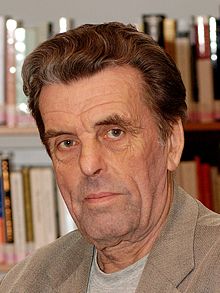Jan Sokol | |
|---|---|
 Sokol in 2007 | |
| Minister of Education, Youth and Sports | |
| In office 2 January 1998 – 22 July 1998 | |
| Prime Minister | Josef Tošovský |
| Preceded by | Jiří Gruša |
| Succeeded by | Eduard Zeman |
| Member of parliament for Prague | |
| In office 7 June 1990 – 4 June 1992 | |
| Personal details | |
| Born | 18 April 1936 Prague, Czechoslovakia |
| Died | 16 February 2021 (aged 84) Prague, Czech Republic |
| Spouse | Františka Sokolová |
| Alma mater | Charles University |
Jan Sokol (18 April 1936 – 16 February 2021)[1][2] was a Czech philosopher, dissident, politician and translator. He briefly served as Minister of Education, Youth and Sports in 1998 under Prime Minister Josef Tošovský. From 1990 to 1992 he was Member of Parliament for Prague. From 2000 to 2007 he served as the first dean of the Faculty of Humanities at Charles University in Prague.[3] Sokol ran for President of the Czech Republic in the 2003 election but lost to Václav Klaus.[4]
He was born in Prague in a Catholic family, his father Jan was an architect, his grandfather František Nušl was an astronomer and mathematician. His younger brother Václav is a graphic artist.[5]
He was not allowed to study and worked as a goldsmith, precision mechanic and software developer.[6][7] Sokol studied mathematics in evening courses (received BA in 1967),[6] translated numerous books on philosophy and religion to Czech (Lévinas, de Chardin, Gadamer, Foucault, Heidegger, Landsberg etc.),[8] participated on the Czech Ecumenical Bible translation (1963–1979)[8] and was one of the first signatories of the Charta 77 manifesto for Human rights.[6]
In 1990 he was elected as a Member of the Czechoslovak Parliament, becoming vice-chairman of the Chamber of Nations and spokesman of the strongest faction Civic Forum (OF).[6][9] In 1998 he was Minister of Education, Youth and Sports in caretaker Josef Tošovský's Cabinet.[6]
In 1993 he obtained an MA in Anthropology,[3] in 1995 a Ph.D. in Philosophy[6] and since 2000 has been a full professor of philosophy.[3] In 2000 Sokol became the first dean of Faculty of Humanities, Charles University in Prague, vice-dean in 2007 and in 2008 was appointed an Officer of the Légion d'honneur.[3] In the Fall Semester 2008 he was a Senior Fellow at CSWR, Harvard University, lecturing on Religion, Ethics and Human rights.[3]
He has been influenced mostly by Bible, Christian tradition, Friedrich Nietzsche, Martin Heidegger, Pierre Teilhard de Chardin, Raymond Ruyer, his father-in-law Jan Patočka[6] and Emmanuel Lévinas.[7] His works mainly dealt with Philosophical Anthropology, Phenomenology, Anthropology of Religion and of Law and in the theory of Human Rights.[10] He has published several books, articles in Czech and in other languages and has delivered many guest lectures in various European countries and in the US, mostly on philosophy, religion, ethics and on European questions.
In a 2020 interview, Sokol stated that he frequently edited Wikipedia in order to reach young people.[11][12] He was prolific contributor to Wikipedia[2][13] and honorary member of Wikimedia Czech Republic.[14][15]
In Czech:
In English::
In German::
In Chinese:
In English:
In German:
In French:
In other languages: